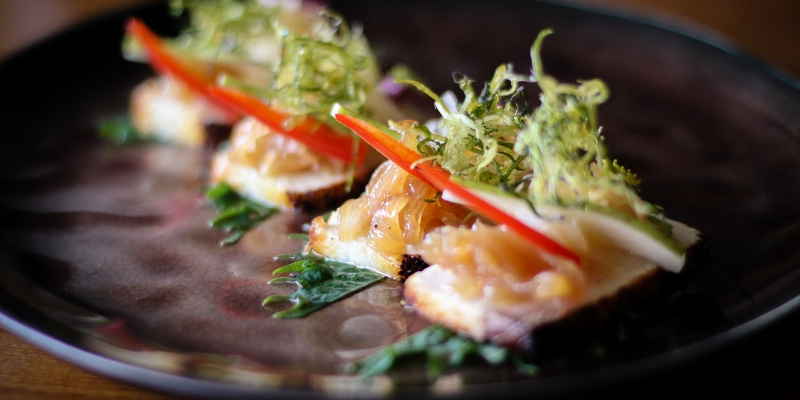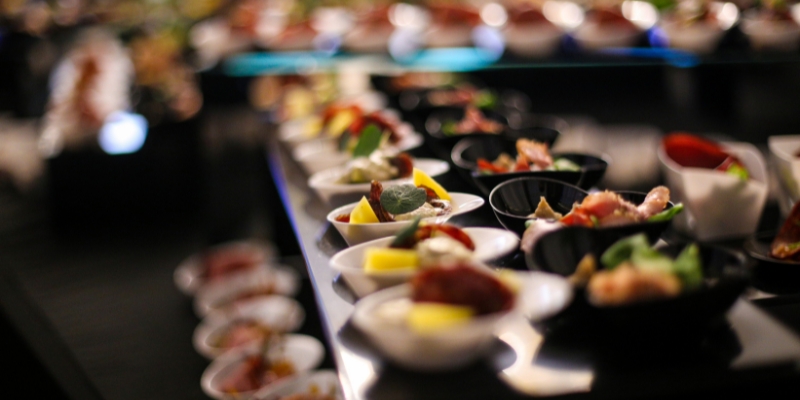Dining is more than just food—it links people worldwide. The eating scene is changing as our globe becomes more networked, providing new dining difficulties that demand sophisticated answers. This article discusses modern eating, including dietary restrictions, allergies, and how globalization and diversity have changed meal etiquette. We emphasize the necessity for clear communication and understanding while eating abroad to respect dietary requirements and allergies. We also provide a detailed dining etiquette guide for tourists to help them enjoy their culinary excursions with cultural respect. Food's ability to unite and bridge cultures stays constant as we traverse the complexity of contemporary eating.

24 Dining Taboos From Around The World:
Dining is as much about culture as cuisine, often with unwritten conventions and rituals. What's OK at dinner in one nation may be a disaster in another. Our collection of 24 global eating taboos, grouped by area, can assist you in negotiating international dining. Be culturally sensitive and respectful when eating abroad since these taboos vary by area and community.
Japan:
Tipping servers is forbidden in Japan. Tipping is disrespectful; outstanding service is expected. This habit comes from the concept that good service is expected, and tipping may question the establishment's quality.
China:
Never put chopsticks upright in rice in China. This is unlucky and rude, like incense offerings for the dead. Avoid it at meals since it reminds you of funerals.
Thailand:
In Thailand, the head is the most holy. Touching anyone's head—even a child's—is disrespectful. Buddhism holds that the head is the body's highest place, near the sky, and should not be touched.
India:
India typically frowns on left-handed eating. For cultural respect, always eat with your right hand. After using the bathroom, the left hand is used to clean, making it impolite for eating.
France:
Avoid ketchup in French cuisine. It denigrates the chef and French cuisine's exquisite tastes. French cuisine takes care in its preparation, and adding condiments means the food lacks taste.
Italy:
Coffee is essential to Italians. Cappuccinos are morning drinks and should never be ordered after lunch or supper. Milk is said to hinder digestion. Therefore, Italians conclude their meals with espresso or coffee.
Spain:
Avoid leaving your tip on the table in Spain—tip the waitress instead. Leaving money on the table may signal that the servant is unworthy of a particular thank you.
Russia:
Avoid shaking hands or handing stuff across Russian doorways. Avoid this unlucky deed. In Russia, doorways are regarded as a boundary between the living and the dead. Thus, it's superstitious to avoid touching them.
Saudi Arabia:
In Saudi Arabia, eating or passing with your left hand is disrespectful. Use your right hand since the left is connected with uncleanliness.
Iran:
In Iran, crossing your legs during dinner is considered rude. Keep both feet on the floor for decorum. In formal dining, crossing the legs is unacceptable.
Turkey:
Do not point your foot in Turkey. Foot soles are the dirtiest part of the body; thus, pointing them is rude. Tucking your feet between your legs while sitting on the floor prevents them from pointing towards people.
UAE:
The UAE discourages public shows of love, like embracing and kissing, particularly during Ramadan. Avoid such gestures at this holy time to honor local traditions.
Ethiopia:
Ethiopians consider left-handed eating filthy. Remember to use your right hand for eating and your left for personal hygiene.
Nigeria:
Blowing your nose at the table is disrespectful in Nigeria. Excuse yourself gently if necessary. Blowing one's nose in public, particularly over dinner, is classless.
Morocco:
Eating with your left hand is impolite in Morocco. Like other civilizations, the left hand is for dirtier chores.
South Africa:
Never aim your feet at someone at a South African dinner table; it's disrespectful. Directing feet towards someone is unpleasant since they are the lowest and dirtiest part of the body.
The US:
American eating etiquette prohibits talking with your mouth full. Consider it rude and distasteful. To respect other diners, complete chewing before talking.
Mexico:
Restaurants in Mexico regularly provide contaminated tap water to tourists. Bottled water keeps you safe and hydrated while traveling.
Brazil
Brazil considers the "OK" gesture (thumb and forefinger circle) insulting in specific situations. Use gestures carefully, particularly in various social circumstances.
Canada:
To avoid awkward discussions during dinner, avoid discussing politics and religion in Canada.
Fiji:
To show respect in Fiji, don't touch anyone's head. It's deemed intrusive to touch the head, the most holy portion of the body.
Australia:
Be sensitive while addressing Australian indigenous land rights. This complicated and delicate issue demands understanding and respect for history and cultures.
Hawaii:
In Hawaii, wearing shoes inside is disrespectful, particularly at home. Hawaiians appreciate cleanliness and harmony; therefore, remove your shoes before entering.
New Zealand:
Listen carefully at a New Zealand Maori "hangi" dinner. Maori etiquette requires waiting your turn to speak and respecting the speaker.
These eating taboos reveal worldwide civilizations and their practices. While knowing every detail is hard, respect and a desire to learn may help ensure a pleasant and culturally sensitive eating experience overseas.

Modern Dining Challenges:
Today's globalized society makes eating worldwide, presenting several dining issues. One of the most significant issues is accommodating dietary restrictions and allergies. Restaurants must handle dietary preferences and constraints as the population becomes more varied and health-conscious. Modern restaurants must accommodate gluten-free, vegan, and severe nut allergies.
Globalization and diversity also affect eating etiquette. Cultural barriers fade, and eating traditions change as the globe gets more linked. Restaurants are becoming cultural melting pots, needing customers and employees to adapt and respect diverse cultures. This development has created intriguing fusion foods but highlighted cultural appropriation and sensitivity concerns. The trick is acknowledging culinary variety while making all guests feel welcome and valued.
Respecting Dietary Restrictions:
Travelers and restaurant personnel must be sensitive to dietary requirements and allergies while eating abroad. Before eating out, folks with dietary limitations must study. Learn local diet-related items and phrases. Explain your allergies and intolerances to restaurant employees politely. Since certain places may offer few dietary-compliant alternatives, it's crucial to be flexible and open to recipe alterations.
Respect and kindness are crucial when dealing with dietary limitations. Understand that not all cultures are acquainted with dietary limitations, and be patient while discussing them. Expect misunderstandings while eating overseas, but gently explain your requirements. Restaurant employees should also be educated to carefully handle dietary restrictions and allergies so customers can eat safely and securely.
Dining Etiquette for Travelers:
Understanding eating etiquette is crucial for visitors wanting to taste diverse cuisines. A complete tourist eating etiquette guide provides cultural awareness and enriches the dining experience. Basic etiquette like coming on time for reservations, using utensils properly, and not chatting with your mouth fully show respect for local customs. Knowing whether tipping is customary may help avoid etiquette mistakes.
Practical suggestions for respecting local traditions might help prevent eating mistakes. Learning essential words like "please" and "thank you" in the native language demonstrates respect for the host culture. Observing restaurant patrons may also teach you how to behave.
Conclusion:
Knowing and reacting to current dining issues is crucial in a world where gastronomic horizons are increasing rapidly. Beyond taste, food appreciation involves respect for varied diets, cultural traditions, and the ever-changing tapestry of global influences. We must approach each meal with openness and care as we handle dietary limitations, allergies, globalization, and multiculturalism's changing dining etiquette. We make eating accessible and pleasurable by recognizing dietary limitations with empathy and care. Compliance with local traditions and etiquette improves the taste of our food and builds cultural understanding while eating abroad. We can unite and appreciate our worldwide culinary history with each shared meal. Respect and understanding should lead our forks and knives in this dynamic world of eating, making each meal a cultural exchange and an incredible discovery.

Sean William May 18, 2024
Bentota Wonders: Must-See Attractions for Your Sri Lanka Travel Itinerary

Juliana Daniel Oct 25, 2023
Make Your Time Memorable During One Day in Catalina Island Tour

Juliana Daniel Nov 01, 2023
Matheran's Multi-Day Tour Adventures

Sean William Mar 11, 2024
All You Need to Know About the Optimal Time for Visiting Galápagos

Sean William May 19, 2024
A Shopper’s Dream: Top Places to Shop in Mauritius

Sean William Oct 27, 2023
Paris Flea Market, Paris: How To Reach, Best Time and Tips

Juliana Daniel Mar 11, 2024
A Journey Back in Time - 6 Aspects to Remember

Juliana Daniel Mar 11, 2024